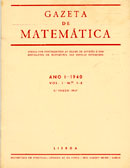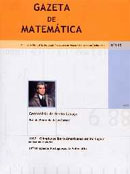|
|
|||||||||||||||||||||||
|
|
|||||||||||||||||||||||
|
|
|||||||||||||||||||||||
|
Portuguese Mathematical Society
The Sociedade Portuguesa de Matemática is a scientific association whose objective is to promote the study and development of Mathematical Sciences and its applications. Founded on 12 December 1940, it was never recognised by the political regime of Salazar and Caetano and was only legally constituted on 10 October 1977.
In the forties, there was a group of Portuguese mathematicians in Portugal with an impressive scientific and pedagogical activity. The activity of this nucleus was expressed in the successive emergence of the Portugaliæ Mathematica (1937), of the Seminário Matemático de Lisboa (1938), of the Centro de Estudos de Matemáticas Aplicadas à Economia (1938), of the Gazeta de Matemática (1939), of the Centro de Estudos Matemáticos of Lisbon and Oporto (1940 and 1942, respectively) and of the Sociedade Portuguesa de Matemática, in 1942. When the first General Meeting of the Sociedade Portuguesa de Matemática was held, there were already more than 100 associates of this body, which clearly reveals the significant implantation of the Society in the community. On the board were, among others, Pedro José da Cunha as Chairman of the Board, Aureliano de Mira Fernandes (1884-1958) as Chairman of the General Meeting and António Aniceto Monteiro (1907-1980) as Secretary-General. Several temporary and permanent commissions were formed in order to realise the objectives of the Sociedade Portuguesa de Matemática, which were to cultivate and promote the study of Mathematical, Pure and Applied Sciences. To this effect, study meetings, conferences and open courses were held, a Bulletin and other mathematical studies were published, participation in colloquia and congresses was promoted and collaboration in national and foreign publications was encouraged. Many of the initiatives mentioned above were fostered by António Aniceto Monteiro who, in conjunction with mathematicians such as Hugo Ribeiro (1910-1988), Zaluar Nunes, Ruy Luís Gomes (1905-1984), Mira Fernandes, José da Silva Paulo, Bento Caraça (1901-1948) and José Sebastião e Silva (1914-1972), among others, contributed towards the creation of a scientific environment that favoured the end of the isolation of Portuguese scientists. Monteiro thus stated: “It is indisputable that we are witnessing today a truly effervescence of activities in the field of mathematical sciences”. The holding of conferences and seminars, the emergence of the Mathematical Studies Centres and the creation of publications such as the Boletim da Sociedade Portuguesa de Matemática, the Portugaliae Mathematica and the Gazeta de Matemática, made possible a regular contact among Portuguese mathematicians from several universities and created more accessible mechanisms for the dissemination of their research works. With regard to research, the role of the Portugaliae Mathematica should be highlighted, as this was an important means of publishing original works and making Portuguese research known to the international scientific community. The Gazeta de Matemática, oriented by teachers and students, made it possible to follow the mathematical movement in other countries more closely. In the years 1946-1947, the political regime in power at the time unleashed an offensive against the University. As a result, Bento Caraça, Ruy Luís Gomes, Zaluar Nunes, José Morgado, António Monteiro, Hugo Ribeiro and Pereira Gomes, among others, were banished from teaching. The Mathematical Centres were practically made extinct and the activities of the Sociedade Portuguesa de Matemática were forbidden in any dependency of the Ministério da Educação Nacional. Persecuted by the political police (PIDE), some of the founding members and promoters of the Sociedade were forced to continue their careers in exile and the activity of the Sociedade Portuguesa de Matemática went through a period of decline. The magazines, however, remained; Portugaliæ Mathematica thanks to the efforts of Zaluar Nunes and Gazeta de Matemática, to those of Gaspar Teixeira. However, the creation of a strong mathematical movement, such as that proclaimed in the forties, was thus postponed. After the revolution of 25 April 1974, the Board, presided over by Santos Guerreiro, finally managed to legalise the society, having registered its first Byelaws in the Government Gazette in 1977. After a long period of enormous difficulties, supported by the tenacity of some of its members, the Sociedade Portuguesa de Matemática could finally freely realise the objectives defined by its founders and contribute towards the dissemination of mathematical knowledge, towards the promotion of the quality of the teaching of Mathematics and towards the dissemination of Portuguese research.
The main activities of the Sociedade Portuguesa de Matemática today are the publication of the scientific magazine Portugaliæ Mathematica (research articles), of the Boletim da SPM (dissemination articles), of the Gazeta de Matemática (oriented by teachers and students) and the organisation of conferences, congresses, seminars and similar activities. The Sociedade organises the National Mathematics Olympiads and promotes the participation of Portuguese teams in the International Mathematical Olympics and in the "Olimpíadas Ibero-Americanas de Matemática".
The Sociedade Portuguesa de Matemática also instituted several prizes: the José Sebastião e Silva Prize, to reward manuals written for Basic and Secondary Education; the José Anastácio da Cunha Prize, which was designed to reward PhD dissertations in Mathematics; and the Bento de Jesus Caraça Prize, aimed at distinguishing the best Mathematics student at the end of Secondary Education.
All those interested in finding out more details about the Sociedade should visit the Sociedade Portuguesa de Matemática’s website, as well as the pages of the publications edited by the Sociedade: Portugaliae Mathematica; Boletim da Sociedade Portuguesa de Matemática; and Gazeta de Matemática. For more on the emergence and activity of the Sociedade Portuguesa de Matemática in its first years of existence, an excellent text by José Morgado, "Para a História da Sociedade Portuguesa de Matemática", may be consulted.
|
|||||||||||||||||||||||
 |
|||||||||||||||||||||||
|
|
|||||||||||||||||||||||
| © Instituto Camões 2003-2005 | |||||||||||||||||||||||

